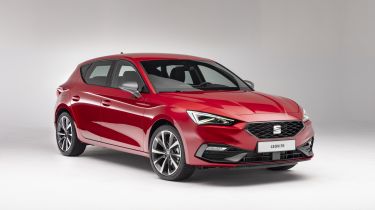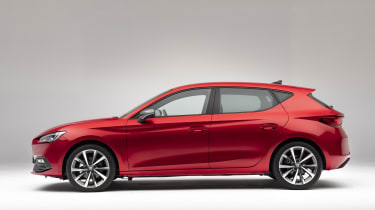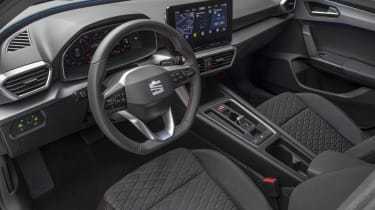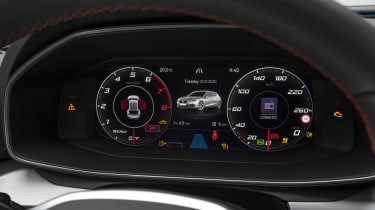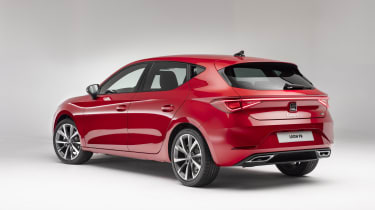2020 SEAT Leon: plug-in hybrid added to line-up
New SEAT Leon e-Hybrid PHEV offers 36 miles of electric range
- New Mk4 SEAT Leon hatchback and estate available to order
- Petrol, diesel, mild-hybrid and plug-in hybrid powertrains
- PHEV model starts at £30,970
The new SEAT Leon is now available as a plug-in hybrid, which promises the lowest running costs in the range if you keep the battery topped up. It joins the rest of the range, which went on sale in May, and starts from £30,970. There’ll also be a more powerful PHEV option for the new Cupra Leon, too.
2020 SEAT Leon e-Hybrid plug-in hybrid
The Leon hybrid uses a 1.4-litre petrol engine, an electric motor and a 13kWh battery. Up to 235mpg is possible and you’ll be able to travel up to 36 miles on electric power. Business users will be drawn to its 27g/km CO2 output, as the resulting 10% Benefit-in-Kind rate is much lower than that of other Leon models. Power, meanwhile, stands at 201bhp, and the e-Hybrid has a brisk 0-62mph time of 7.5 seconds.
The best hatchbacks to buy in 2020
You can order the PHEV in FR, FR Sport, Xcellence, Xcellence Lux and First Edition trims, but it’s still about £4,000 more than any other FR model. It looks even more expensive when you consider the fully electric Skoda Enyaq SUV will start from under £30,500 after the plug-in car grant.
Prices, specs and release date
Seven trim levels are available. Entry-level SE includes 16-inch alloy wheels, keyless entry, LED headlights, an eight-inch touchscreen and a leather steering wheel. All models also get metallic paint as standard, saving buyers around £600.
Mid-range SE Dynamic, costing from £20,955, should prove popular - it’s only £1,100 more expensive than SE but adds a set of larger alloys, parking sensors all-round, a larger 10-inch infotainment screen with Apple CarPlay and Android Auto, and a 10.25-inch digital instrument cluster.
The sporty FR model (shown here) starts at £23,185 and has a body kit, lower suspension and twin-exit exhaust pipes. Standard kit includes LED tail-lights with scrolling indicators, sports seats, three-zone air conditioning, wireless phone charging and rear USB ports.
Then there’s the FR Sport for £25,075, which has bigger wheels, wraparound ambient lighting and suede upholstery, and the £30,040 FR First Edition, with a rear-view camera and predictive adaptive cruise control. Xcellence and Xcellence Lux add luxury with features such as keyless entry and leather upholstery, and cost £26,080 and £27,435 respectively.
Styling
Compared with the Volkswagen Golf, the SEAT Leon has historically undergone more radical design changes from one generation to the next, but SEAT appears to have taken a leaf out of VW's book this time. Changes are subtle enough that the car is instantly recognisable as a Leon but are more comprehensive than a mere facelift.
The front and rear wheels are pushed 50mm further apart for a more athletic stance, and there's a greater interplay between curves and sharp edges. Most noticeably, there's now a sweeping line flowing from above the front wheels and over the rear doors, giving the Leon an appearance reminiscent of the sporty Mazda3. Its low nose and windscreen pillars also curve rearwards, improving aerodynamics as well as style, and metallic paint will come as standard.
At the rear, the lights are connected by a full-width LED strip, body-coloured bumpers have a smooth shape and FR versions feature integrated chrome tailpipes. The hatchback is longer too: 86mm more than before but 17mm narrower and 3mm lower. The SEAT Leon ST estate gets a further 10mm increase in length, helping boot space grow from 587 to an impressive 617 litres. The hatchback's boot remains the same size as before at 380 litres.
Interior
The outgoing Leon had a competitive infotainment system, but it takes another step on here. SEAT's designers have moved the central display from the dashboard so it's now a free-standing tablet, allowing for a much slimmer fascia, housing just a set of angular air vents, USB-C ports and lighting controls. A highly textured dashboard and swathe of dark silver trim accentuates the car’s sporty character.
When an automatic gearbox is fitted, a small rocker-switch replaces a traditional gearlever, freeing up space for cupholders, a smartphone tray and generous storage cubby. Instead of buttons, everything is focused on the infotainment and Digital Cockpit instrument displays, that can be controlled using a combination of steering wheel controls, gesture recognition and voice commands.
Designers have also concentrated on ambient lighting more than ever before, with a wraparound dashboard light spanning the entire width of the car and stretching onto the doors. Not only does it brighten up the interior, it can also provide functions such as blinking beneath the door mirrors when the blind spot detection activates.
Technology
The latest Leon has an almost entirely digital user interface and relies heavily on connected services. This includes new 'Car-to-X' cloud-based technology that can warn drivers of hyper-local information such as the colour of the next set of traffic lights and whether there's an accident up ahead.
Driver assistance also takes a step forward, thanks to features like Predictive Adaptive Cruise Control that uses GPS data, the front-facing camera and traffic sign recognition to actively change the car's speed for the upcoming road layout and conditions. The driver must keep at least one hand on the steering wheel or the system can jolt the brakes or stop the car altogether.
Engines, performance and chassis
The fourth-generation Leon sits on an updated version of the MQB platform used for the previous model and numerous other Volkswagen Group cars. Like the Mk8 Volkswagen Golf, it also features a refreshed range of engines, some of which now get emissions-reducing electrified technology.
Stick with petrol and there's a 109bhp 1.0-litre three-cylinder; a 1.5-litre four-cylinder offering 128 or 148bhp. There's no 1.6-litre diesel engine planned this time, but a 2.0-litre TDI will be offered with 113bhp. Later on, you’ll also be able to choose a 148bhp diesel and a 187bhp 2.0-litre petrol. Engines come with a six-speed manual gearbox as standard but automatic transmissions are also expected to be popular. Choosing the latter also means 48-volt mild-hybrid tech is added, boosting efficiency by recuperating energy under braking and using it to power the car's electrics and provide a boost to acceleration.
It's unlikely we'll see a fully electric Mk4 Leon because SEAT is poised to launch its all-electric el-Born, which is roughly the same size.
Want to know more about the current SEAT Leon? Check out our in-depth review, or take a look at our picks for the best new cars coming in 2020.
Recommended
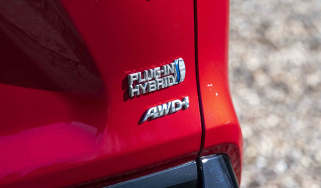
Petrol and diesel car ban relaxed with hybrids permitted beyond 2030
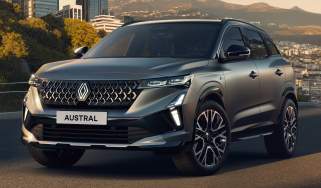
Sharper design and tech for Renault Austral hybrid SUV
Most Popular

Suzuki’s new 10-year warranty is free – here’s how to get it
Tips & advice

Car dashboard warning lights: what does each symbol mean?

Electric car charging stations: public networks, charger types, apps and maps


